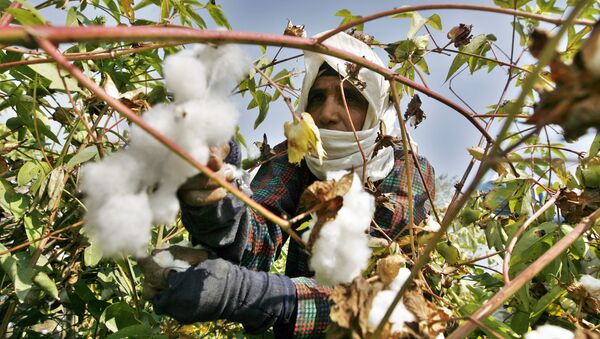"There is huge potential for Egypt to export industrialized agricultural products, leather products, furniture, readymade garments and its world famous Egyptian cotton in return for Russian machinery, machinery tools and equipment, heavy trucks and agricultural equipment," the minister said.
According to him, trade between Egypt and Russia has nearly doubled, growing from $3 billion in 2013 to $5.5 billion in 2014. Abd-Nur stressed, however, that some sectors of their economic cooperation were still far from reaching their full potential.
"We simply haven't done our homework and missed very important areas of our cooperation that have a lot of potential," he said.
Following the visit of Russian President Vladimir Putin to Egypt in February, the sides agreed to increase military, trade, security and economic cooperation.
Russia and Egypt have also agreed to develop ties in the field of nuclear energy. A case in point being the contract signed in February by Rosatom to participate in the construction of Egypt's first nuclear power plant.
Investors from Russia have shown interest in developing two industrial zones in Egypt, including along the newly-expanded Suez Canal, Mounir Fakhri Abd-Nur said.
Last week, Egypt inaugurated a new 44.7-mile lane of the Suez Canal, part of which will run parallel to the existing waterway. It is planned to use the reinvigorated canal to develop an industrial, commercial and logistical hub in Egypt.
"We are very actively working on allocating an industrial zone for the Russian investments. Two weeks ago we hosted a delegation of Russian investors and showed them two possible industrial areas," the minister said.
According to Abd-Nur, the delegation visited the area of the Suez Canal and an industrial zone north of Faiyum city, near Cairo.
The minister said the investors liked both zones, stressing that the two zones are not "mutually exclusive."
"We are going ahead with that," he said.
Earlier this month, Egypt's Ambassador to Russia Mohammed Badri told Sputnik that Russian shipbuilding, logistics, petrochemical and agricultural companies have shown interest in helping to develop industrial zones along the Suez Canal.
A working group has been set up at the Egyptian Embassy in Moscow to reach out to Russian investors willing to take part in the project.
The package of projects, announced by President Abdel Fattah Sisi last August, involves building industrial hubs for logistic and ship services, and transforming cities along the expanded Suez Canal into centers of international trade.
Russia's Gazprombank has proposed to Egypt that it consider using the Russian national currency in certain deals, Mounir Fakhri Abd-Nur said.
"I received a letter yesterday from Gazprombank. They have offer to come to Egypt sometime in September to talk and negotiate the details and technicalities of using the ruble in specific grain deals and loans," the minister said.
He added that last June he met with Russian grain exporters, who were open to receiving payment in rubles. Abd-Nur stressed that receiving loans in rubles instead of dollars would be of even greater interest to Cairo.
In the beginning of 2015, then Egyptian Minister of Tourism Hisham Zazou said that Cairo and Moscow were planning to use the ruble in mutual payments. However, his successor, Khaled Abbas Rami, told Sputnik that it this is unlikely, since Egypt needed "hard currency."
The ruble lost about half its value against the dollar in late 2014 amid low global oil prices and Western economic sanctions against Russia, imposed over the Ukrainian crisis. However, the ruble has since regained some ground.
In November 2014, Russian President Vladimir Putin said Moscow was leaving the "dollar dictatorship," focusing on using other currencies, such as the ruble and the yuan, in trade.





